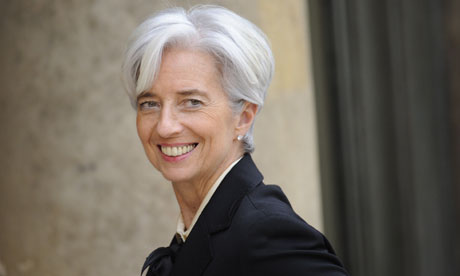Dominique Strauss-Kahn has resigned as managing director of the International Monetary Fund, saying he wanted to devote "all his energy" to battle the sexual assault charges he faces in New York. Strauss-Kahn's resignation comes after increasing international pressure for him to step down as he faces charges of assaulting an employee at a New York hotel. A grand jury has been convened to assess whether Strauss-Kahn will be indicted. Their decision will not be known until Friday. The decision to press for bail ahead of the decision suggests lawyers are urgently trying to free him. If he is released on bail, the deadline to secure an indictment would be extended.
However, The IMF's statement late on Wednesday said the process of choosing a new leader would begin, but in the meantime John Lipsky would remain acting managing director. Several potential candidates to replace Strauss-Kahn have already been suggested. The 24-member executive board, which will pick Strauss-Kahn's successor, held a preliminary discussion on Friday at the IMF's headquarters in Washington. But IMF officials gave no indication when a decision might be made.
But the rumors are that the European support is rising to pressure for Christine Lagarde's IMF bid. Britain, Germany, and France's interior minister have expressed support for French Finance Minister Christine Lagarde to become the new head of the International Monetary Fund. "I hope it will be a European and Christine Lagarde obviously has all the qualities to be an excellent director of the IMF, and besides, many countries support her," said French Interior Minister Claude Gueant, speaking on Europe 1 radio. Britain's Chancellor of the Exchequer George Osborne called Lagarde “the outstanding candidate for the IMF” while German Finance Minister Wolfgang Schaeuble said, “Europe would have the best chance to secure the post again with Christine Lagarde, if she decides to run.” The European Union’s 27 members hold the biggest IMF stake, but many emerging economies think continuing to have a European head of the IMF is out of touch with the current world economy. A Treasury official on Thursday said the United States had not decided whether to support Lagarde or a non-European for the job.
Italian Prime Minister Silvio Berlusconi has openly endorsed Lagarde for the job, saying she would make "a great choice." That view was backed by Swedish Finance Minister Anders Borg, who told journalists that Lagarde carries weight internationally and has a lot of experience.
Sarkozy hasn't spoken publicly about Lagarde, possibly because that would feed domestic conspiracy theories that Strauss-Kahn's troubles are a plot by political rivals. Strauss-Kahn, a Socialist, had been seen as the potential winner of France's presidential election next year, while the conservative Sarkozy's poll ratings are dismal.
British Chancellor George Osborne is to formally nominate Christine Lagarde for the post of managing director of the International Monetary Fund (IMF). In a statement Mr Osborne said Ms Lagarde had "shown real international leadership as chair of the G20 finance ministers this year". "She has also been a strong advocate for countries tackling high budget deficits and living within their means," he said. "We support her because she's the best person for the job, but I also personally think it would be a very good thing to see the first female managing director of the IMF in its 60-year history."
The IMF may face a choice between naming its first woman leader or its first leader from the developing world. Emerging economies see Europe's traditional stranglehold on the position as increasingly out of touch with the world economy, but have not yet united around a candidate.
German Chancellor Angela Merkel said Friday that she "very much appreciates the French finance minister." She insisted she wasn't announcing Lagarde's candidacy, just sharing her views.
Merkel has also said the next IMF chief should be a European, since the fund is deeply involved in tackling the eurozone's sprawling debt crisis. Germany's view is critical, since as the continent's economic powerhouse it funds much of the bailouts to weaker eurozone nations.
Lagarde, 55, has a clean-cut image and has been praised for her acumen in helping steer Europe through the global financial crisis and its more recent debt woes. She speaks impeccable English and spent much of her career in the United States as a lawyer. One of the longest-serving ministers under French President Nicolas Sarkozy, Lagarde eased French labor laws and helped France weather its worst recession since World War II better than many other developed countries.
A champion swimmer as a teen, Lagarde is known for her colorful language and a sense of humor, and for being vocally pro-market in a capitalism-wary nation. When she took over as finance minister, she urged compatriots to stop their endless ideological yammering and "roll up your sleeves."
Christine Lagarde, the French finance minister, warned her US counterpart Hank Paulson that he had to bail out US investment bank Lehman Brothers or face global financial collapse, but her advice went unheeded as the world saw the financial crisis of 2008. Mrs Lagarde - attributed with playing a key role in brokering a bailout deal among G7 finance ministers in Washington. In an interview with the Daily Telegraph, she warned that the world's hedge funds could be the next institutions to be hit by the financial turmoil. She warned that governments must be "vigilant" over the health of hedge funds. "Initially everybody thought the hedge fund sector would be the first one to actually cause the collapse.
"The position of France is [that the selection process should be] ...'open, transparent and merit based.’”
Now it is the time to see that can she really count on an open, transparent and merit based selection process and if it does, where does it take the French finance minister.


No comments:
Post a Comment